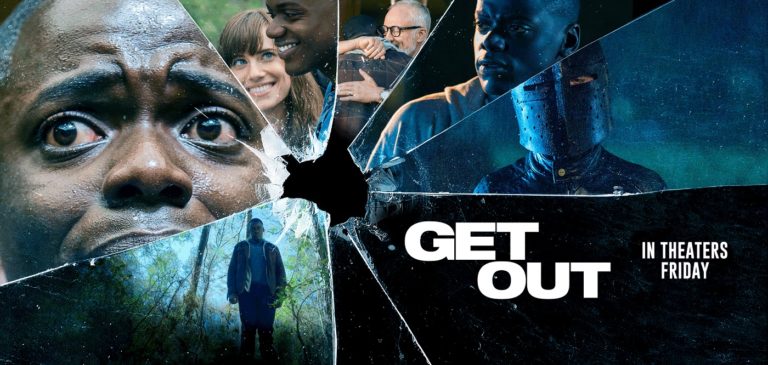What would a queer version of Get Out be like? How would you turn the everyday horrors of queer lives into a literal horror show?
When I first saw Get Out, I almost immediately started thinking about what the queer equivalent would be. The women’s equivalent is often seen as Rosemary’s Baby, but Roman Polanski can go straight to hell and he sure as shit doesn’t get to tell our story. There are way better examples: my favorite is probably Season 1 of Jessica Jones, which had me crawling out of my skin, fascinated and repelled, both wanting to turn away and feeling compelled to keep watching. (Yes, that’s a rave review. It’s so good!)
So what would a queer equivalent be? It would probably focus on body horror and bodily control, like Get Out and Jessica Jones and other horror shows about oppression. But what, specifically, would make it queer?
Invisibility and visibility. These keep grabbing my mind, and won’t let go.
Queers commonly have two fears, seemingly opposites but really two sides of the same coin. When we’re growing up or closeted, we’re afraid of being seen. There’s a reason so many queer kids get into theater: we learn from a young age to play-act, to choose our faces, to use art and artifice to be authentic while concealing who we are. Being seen can mean ostracization at best, violence and death at worst.
Then when we aren’t closeted, when we’re out and loud and proud, our horror is not being seen. Our culture is permeated with the assumption that everyone is straight and cis: in law, history, pop culture, everyday life. It’s like we’re not even here. And when we do jump up and down screaming, “We’re here! We’re queer!”, we get condemned for being flamboyant and pushy.
So my movie would be about both visibility and invisibility. Maybe the characters would learn to become invisible, but then wouldn’t be able to turn it off. Or other people might have the control switch: villains could turn our visibility on and off, seeking power or profit or cruelty for its own sake. To make it really fucked-up and accurate, some of us could get that control switch and use it on each other: white queers against blacks, gay men against lesbians, gay men and lesbians against bisexuals, LGBs against Ts. Ooo, this could work. I now have a working title: Delete.
Of course my movie would have to play with sex. When queers are visible, our sexuality is either exaggerated or erased. We’re either ravenously horny sex fiends, or we’re the nice neighbors and friends, supporting straight people in their love lives and having none of our own. The queer Get Out might have sexual body horror, with our genitals suddenly growing huge and then disappearing in a flash. Or you know the nightmares where you show up to work naked? My movie could have that — paired with a reverse nightmare, showing up at a sex party with a business suit glued to your skin.
There could also be a struggle for the characters to see themselves. I’m imagining fun-house dysmorphia mirrors, trick mirrors showing you faces other than your own, the vampire trope of looking in the mirror and seeing nothing. And we would definitely fade out of photos. Maybe the only lasting pictures of us would be selfies.
Mismatched voices could work, too. My wife Ingrid is seriously unsettled by the movie trope of someone else’s voice coming out of your mouth. (Want to scare the crap out of her? Whisper in her ear, “There is no Dana — only Zuul.”) Ingrid’s fear makes more sense to me now, looking at it through this lens. In my queer horror film, we aren’t just seen or not seen against our will. We’re forced to say things we don’t want to say, using voices that aren’t our own. Like creepy ventriloquist puppets being the victims instead of the monsters. Or we might be silenced, our mouths sewn shut or eradicated, choking on words we can’t say. Like the old ACT UP slogan: Silence equals death.
And if you really want to get into body horror, you could flash back to the worst years of the AIDS pandemic. People in ACT UP used to say that fighting AIDS was like being in a war most of the world didn’t see. I can see that working in a horror movie: an invisible battlefield, with all its grief and gore, superimposed on the visible world and desperately trying to get its attention.
Could my imaginary movie have anything like the impact of Get Out? So much of what made Get Out so powerful (apart from Jordan Peele being a fucking genius) was that this deceptively quiet movie came out in 2017, in the middle of a massive, highly volatile cultural upheaval about racism and white supremacy. As of this writing, we’re in a different place with homophobia (in the U.S., anyway). Maybe a trans Get Out would make more sense than a gay one. Right now, trans-ness and trans people are evoking horror among cis people that’s irrational way past the point of derangement. An ironic switcheroo might almost be too easy. Who Are The Real Monsters? It’s not the shapeshifters — it’s the normies! Oooooo!
Anyway. Any queer filmmakers out there inspired by this? I want a little cash up front, a quarter of a point, and an “inspired by” credit. Go for it!


